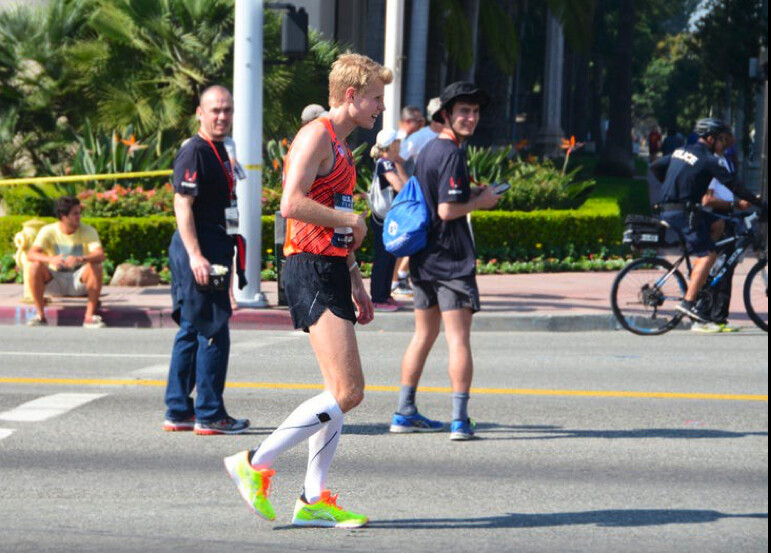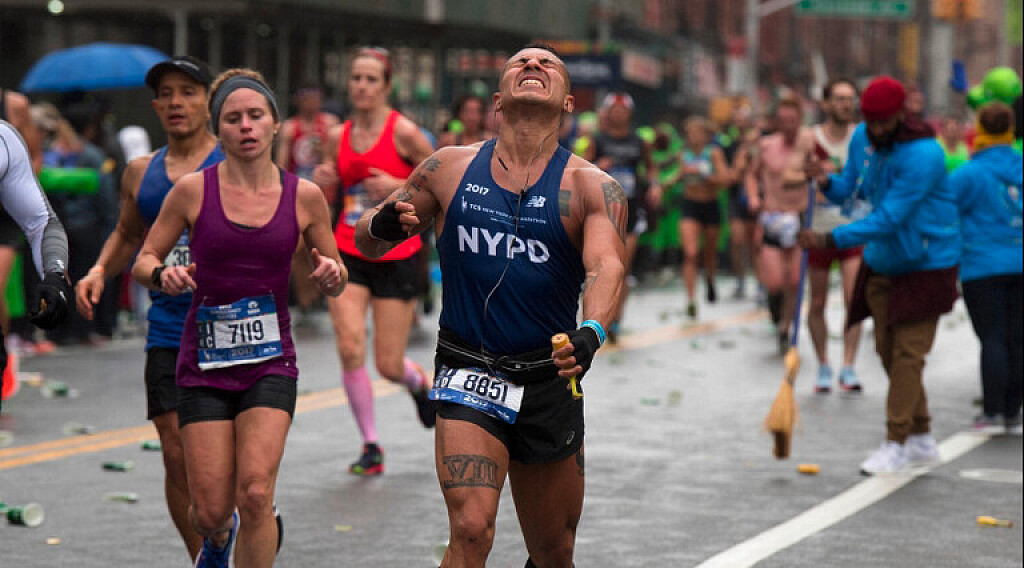Running News Daily
Running News Daily is edited by Bob Anderson. Send your news items to bob@mybestruns.com Advertising opportunities available. Train the Kenyan Way at KATA Kenya and Portugal owned and operated by Bob Anderson. Be sure to catch our movie A Long Run the movie KATA Running Camps and KATA Potato Farms - 31 now open in Kenya! https://kata.ke/
Index to Daily Posts · Sign Up For Updates · Run The World Feed
How Much Will Hitting the Wall Hurt Your Marathon Time?
New big-data study digs into hitting the wall in the marathon, revealing who is most likely to crash, when, and how much it will cost you. New big-data study digs into hitting the wall in the marathon, revealing who is most likely to crash, when, and how much it will cost you.
A massive new analysis of marathon splits and finish times provides us with more information on “hitting the wall” than anything previously published. It also answers some questions we have never thought to ask before.

Ireland’s Barry Smyth became interested in marathon data about five years ago. Since then, he has published a handful of big-data articles analyzing performances and even the training behind performance. He has summarized some of this work in nontechnical articles at Medium.com. Smyth is director of the Insight Centre for Data Analytics at University College Dublin.
In his new paper, “How recreational marathon runners hit the wall: A large-scale analysis of late-race pacing collapse in the marathon,” Smyth dug into an astonishing 4.1 million marathon performances achieved by 2.7 million different runners from 2005 to 2019. For each performance, he collected every 5K split (8 of them per marathon), plus the final 2.195K split. The paper is published by PLOS One and is available in free, full-text form.
Smyth eventually refined his list of runners to 717,000 unique individuals for whom he could locate multiple marathon performances. This allowed him to draw conclusions about the career arc of individual performances. He managed to collect marathon finish-times that extended backwards and forward nine years from the time of each runner’s personal best marathon.
With all this data, Smyth could have chosen to concentrate on any number of different explorations. In this paper, he focused on: male vs female HTW (hitting the wall) differences, how much time you will lose when you HTW, and when in your career you are most likely to HTW.
A last preliminary note: Smyth established an arbitrary but objective definition for HTW. He took runners’ splits from 25K to the finish, and compared this pace with their splits from 5K to 20K. Runners who slowed by at least 20 percent for at least a 5K distance late in the race were defined as HTW-ers.
The guy. No contest. Twenty-eight percent of male runners hit the wall versus just 17 percent of female runners. This data held relatively constant for different ability levels and age-groups.
Women tended to hit the wall slightly sooner than men — at 29.3K vs 29.6K — but their bad patch lasted slightly less distance than the men’s — 9.61K vs 10.7K. This meant that more women recovered from their slow running prior to the finish line than men.
On average, men lost 31.5 minutes and the women lost 33.2 minutes.
Men slowed more when they hit the wall, suffering a relative slowdown of 40 percent vs 37 percent for women. This was calculated by comparing the runner’s finish time in the given HTW marathon with their best marathon time in recent years.
The time difference is a trivial amount, mostly influenced by the well-established male-female gap in marathon finish times. In Smyth’s data set, men who HTW had an average finish time of 4:37 vs women who averaged 5:07.
Both men and women are most likely to hit the wall in the three years prior to their PR effort. This is the point where you are improving, and “going for it,” but maybe haven’t put all the pieces together yet. During this 3-year period, 40% of men are likely to HTW vs 28% of women.
During years 4–9 prior to your PR, the equivalent percentages are lower: 26% (men) and 16% (women). In the three years after your PR, the percentages are 32% (men) and 21% (women). Smyth speculates that we may ease off on the throttle a bit in the years after a PR.
The answer here is faster runners, which is a bit counterintuitive. You might expect that they have less to lose. However, Smyth’s data shows the opposite. “Faster runners are associated with higher costs when they hit the wall,” he noted in an email. This is both an absolute and relative cost.
Smyth believes this finding is a function of the fact that fast runners have very fast personal records. When they attempt to beat these records, they risk a lot. Also, slower runners may have proportionally slower PRs. They might not have tried as hard in their marathon bests as fast runners did. This means that slower runners may have more margin for error if they mis-pace a marathon.
Here’s a table with data from a few marathons (including the 6 world marathon majors) showing an example of Smyth’s approach:
In his concluding remarks, Smyth notes that his huge data set allows him to do lots of slicing and dicing.
Yet he cautions that we shouldn’t lose sight of the big picture. The reasons for HTW and the outcomes of HTW are largely similar across all runners: You probably didn’t train enough, you probably didn’t pace the marathon correctly, maybe you didn’t fuel and hydrate properly… and, as a result, you’re going to pay a price — a steep price.
“Runners and coaches have the potential to impose some level of control on whether a runner will hit the wall by focusing on making better decisions,” he writes. He adds that these better decisions could be especially helpful to male runners and to all marathoners who are chasing a personal record.
by Outside
Login to leave a comment




